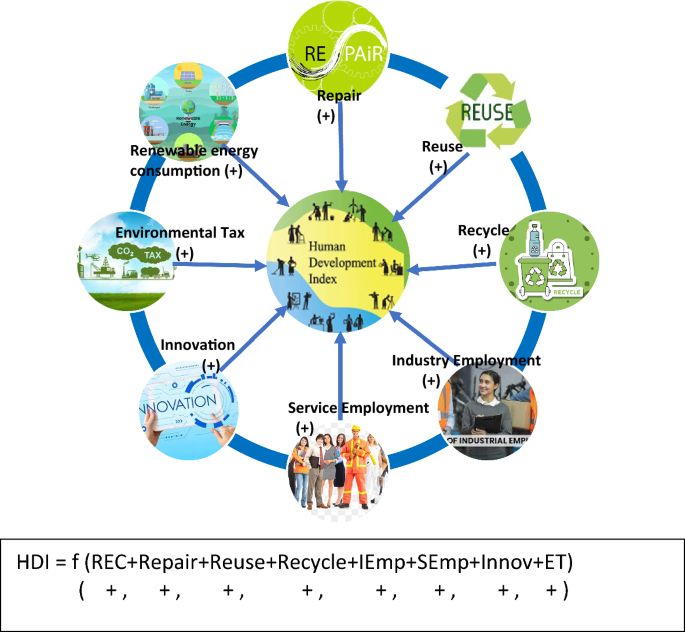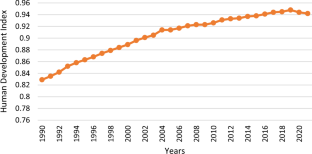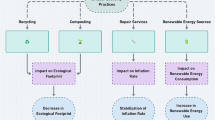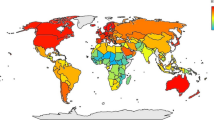Abstract
The circular economy has garnered significant consideration due to its ability to contribute to human development. This study presents a comprehensive analysis of the individual effects of four categories of circular economy, namely renewable energy consumption (REC), recycle, reuse, and repair, on human development. For this purpose, we collected time series data of Germany from 1990 to 2021 and applied a dynamic ARDL simulation technique to compile empirical results. The findings show that the REC has positive and significant impact on human development. Reuse and Recycle have an inverse and significant influence on human development in Germany. Whereas human development is neutral to repair. Additionally, the control variables, environmental tax and industrial employment also have negative impacts on human development. Based on the findings, the study suggests that policymakers should design suitable, efficient, and targeted measures to foster the role of each category of circular economy for human development in Germany.
Graphical abstract
We examined the impact of various categories of circular economy on human development in Germany. The findings indicate that REC is positively and significantly associated with human development. The repair has a neutral impact on human development as a category of circular economy. The study also finds that reuse and recycling negatively and significantly affect human development in Germany.





Similar content being viewed by others
Data availability
We used secondary data for this study. If needed, we can provide data and materials used in the analysis.
References
Abbas, J., Al-Sulaiti, K., Lorente, D. B., Shah, S. A. R., & Shahzad, U. Reset the industry redux through corporate social responsibility: The COVID-19 tourism impact on hospitality firms through business model innovation. In Economic Growth and Environmental Quality in a Post-Pandemic World (pp. 177–201). Routledge (2022).
Abokersh, M. H., Norouzi, M., Boer, D., Cabeza, L. F., Casa, G., Prieto, C., Jiménez, L., & Valles, M. (2021). A framework for sustainable evaluation of thermal energy storage in circular economy. Renewable Energy, 175, 686–701.
Adedoyin, F. F., Erum, N., Taşkin, D., & Chebab, D. (2023). Energy policy simulation in times of crisis: Revisiting the impact of renewable and non-renewable energy production on environmental quality in Germany. Energy Reports, 9, 4749–4762.
Alaerts, L., Van Acker, K., Rousseau, S., De Jaeger, S., Moraga, G., Dewulf, J., De Meester, S., Van Passel, S., Compernolle, T., Bachus, K., Vrancken, K., & Eyckmans, J. (2019). Towards a more direct policy feedback in circular economy monitoring via a societal needs perspective. Resources, Conservation and Recycling, 149, 363–371.
Alnajem, M., Mostafa, M. M., & ElMelegy, A. R. (2021). Mapping the first decade of circular economy research: A bibliometric network analysis. Journal of Industrial and Production Engineering, 38(1), 29–50.
Androniceanu, A., Kinnunen, J., & Georgescu, I. (2021). Circular economy as a strategic option to promote sustainable economic growth and effective human development. Journal of International Studies., 14(1), 2071–8330.
Baars, J., Domenech, T., Bleischwitz, R., Melin, H. E., & Heidrich, O. (2021). Circular economy strategies for electric vehicle batteries reduce reliance on raw materials. Nature Sustainability, 4(1), 71–79.
Balsalobre-Lorente, D., Abbas, J., He, C., Pilař, L., & Shah, S. A. R. (2023). Tourism, urbanization and natural resources rents matter for environmental sustainability: The leading role of AI and ICT on sustainable development goals in the digital era. Resources Policy, 82, 103445.
Beccarello, M., & Di Foggia, G. (2018). Moving towards a circular economy: Economic impacts of higher material recycling targets. Materials Today Proceedings, 5(1), 531–543.
Ben Mbarek, M., Saidi, K., & Rahman, M. M. (2018). Renewable and non-renewable energy consumption, environmental degradation and economic growth in Tunisia. Quality & Quantity, 52, 1105–1119.
Brando, P., Macedo, M., Silvério, D., Rattis, L., Paolucci, L., Alencar, A., Coe, M., & Amorim, C. (2020). Amazon wildfires: Scenes from a foreseeable disaster. Flora, 268, 151609.
Bracquene, E., Peeters, J. R., Burez, J., De Schepper, K., Duflou, J. R., & Dewulf, W. (2019). Repairability evaluation for energy-related products. Procedia CIRP, 80, 536–541.
Chang, Q., & Goplerud, M. (2024). Generalized Kernel Regularized Least Squares. Political Analysis, 32(2), 157–171.
Chauhan, A., Jakhar, S. K., & Chauhan, C. (2021). The interplay of circular economy with industry 4.0 enabled smart city drivers of healthcare waste disposal. Journal of Cleaner Production., 10(279), 123854.
Chioatto, E., & Sospiro, P. (2023). Transition from waste management to circular economy: The European Union roadmap. Environment, Development and Sustainability, 25(1), 249–276.
Chui, K. T., Lytras, M. D., & Visvizi, A. (2018). Energy sustainability in smart cities: Artificial intelligence, smart monitoring, and optimization of energy consumption. Energies 11, 2869. Energy, 158, 1080–1091.
Corona, B., Shen, L., Reike, D., Carreón, J. R., & Worrell, E. (2019). Towards sustainable development through the circular economy—A review and critical assessment on current circularity metrics. Resources Conservation and Recycling, 151, 104498.
Corvellec, H., Stowell, A. F., & Johansson, N. (2022). Critiques of the circular economy. Journal of Industrial Ecology, 26(2), 421–432.
Daú, G., Scavarda, A., Scavarda, L. F., & Portugal, V. J. T. (2019). The healthcare sustainable supply chain 4.0: The circular economy transition conceptual framework with the corporate social responsibility mirror. Sustainability, 11(12), 3259.
Deloitte (2016), Study on Socioeconomic Impacts of Increased Reparability of Increased Reparability: Final Report, Prepared for the European Commission, DG ENV. European Commission, Brussels.
Desing, H., Brunner, D., Takacs, F., Nahrath, S., Frankenberger, K., & Hischier, R. (2020). A circular economy within the planetary boundaries: Towards a resource-based, systemic approach. Resources Conservation and Recycling, 155, 104673.
D'Urzo, M., & Campagnaro, C. (2023). Design-led repair & reuse: An approach for an equitable, bottom-up, innovation-driven circular economy. Journal of Cleaner Production, 387, 135724.
Geissdoerfer, M., Savaget, P., Bocken, N. M., & Hultink, E. J. (2017). The Circular Economy–A new sustainability paradigm?. Journal of Cleaner Production, 143, 757–768.
Hao, Y., Wang, Y., Wu, Q., Sun, S., Wang, W., & Cui, M. (2020). What affects residents’ participation in the circular economy for sustainable development? Evidence from China. Sustainable Development, 28(5), 1251–1268.
Horbach, J., & Rammer, C. (2020). Circular economy innovations, growth and employment at the firm level: Empirical evidence from Germany. Journal of Industrial Ecology, 24(3), 615–625.
International Energy Agency (2020). Germany 2020 - Energy Policy Review. Accessed from https://iea.blob.core.windows.net/assets/60434f12-7891-4469-b3e4-1e82ff898212/Germany_2020_Energy_Policy_Review.pdf. Accessed on 26-04-2024.
Islam, K. N., Sarker, T., Taghizadeh-Hesary, F., Atri, A. C., & Alam, M. S. (2021). Renewable energy generation from livestock waste for a sustainable circular economy in Bangladesh. Renewable and Sustainable Energy Reviews, 139, 110695.
Jaeger-Erben, M., Frick, V., & Hipp, T. (2021). Why do users (not) repair their devices? A study of the predictors of repair practices. Journal of Cleaner Production., 286, 125382. https://doi.org/10.1016/j.jclepro.2020.125382
Jang, Y. C., Lee, G., Kwon, Y., Lim, J. H., & Jeong, J. H. (2020). Recycling and management practices of plastic packaging waste towards a circular economy in South Korea. Resources Conservation and Recycling, 158, 104798.
Jordan, S., & Philips, A. Q. (2018). Cointegration testing and dynamic simulations of autoregressive distributed lag models. Symposium (international) on Combustion, 18(4), 902–923.
Kazancoglu, I., Sagnak, M., Kumar Mangla, S., & Kazancoglu, Y. (2021). Circular economy and the policy: A framework for improving the corporate environmental management in supply chains. Business Strategy and the Environment, 30(1), 590–608.
Khajuria, A., Atienza, V. A., Chavanich, S., Henning, W., Islam, I., Kral, U., & Li, J. (2022). Accelerating circular economy solutions to achieve the 2030 agenda for sustainable development goals. Circular Economy, 1(1), 100001.
Kirchherr, J., Reike, D., & Hekkert, M. (2017). Conceptualizing the circular economy: An analysis of 114 definitions. Resources Conservation and Recycling, 127, 221–232.
Knäble, D., de Quevedo Puente, E., Pérez-Cornejo, C., & Baumgärtler, T. (2022). The impact of the circular economy on sustainable development: A European panel data approach. Sustainable Production and Consumption, 34, 233–243.
Laitala, K., Klepp, I. G., Haugrønning, V., Throne-Holst, H., & Strandbakken, P. (2021). Increasing repair of household appliances, mobile phones and clothing: Experiences from consumers and the repair industry. Journal of Cleaner Production., 282, 125349. https://doi.org/10.1016/j.jclepro.2020.125349
Lederer, J., Gassner, A., Kleemann, F., & Fellner, J. (2020). Potentials for a circular economy of mineral construction materials and demolition waste in urban areas: A case study from Vienna. Resources, Conservation and Recycling, 161, 104942.
Lee, J. W. (2019). Long-run dynamics of renewable energy consumption on carbon emissions and economic growth in the European Union. International Journal of Sustainable Development & World Ecology, 26(1), 69–78.
Llorente-González, L. J., & Vence, X. (2020). How labour-intensive is the circular economy? A policy-orientated structural analysis of the repair, reuse and recycling activities in the European Union. Resources, Conservation and Recycling, 162, 105033.
Luttenberger, L. R. (2020). Waste management challenges in transition to circular economy–case of Croatia. Journal of Cleaner Production, 256, 120495.
Marrucci, L., Daddi, T., & Iraldo, F. (2021). The contribution of green human resource management to the circular economy and performance of environmental certified organisations. Journal of Cleaner Production, 319, 128859.
Maslyuk, S. Energy Consumption Transition and Human Development. In Institutions, Efficiency and Evolving Energy Technologies, 34th IAEE International Conference, June 19–23, 2011. International Association for Energy Economics. (2011)
Mavropoulos, A., & Nilsen, A. W. (2020). Industry 40 and circular economy: Towards a wasteless future or a wasteful planet? John Wiley & Sons.
Mauss, N. A., Bühner, D., & Fottner, J. (2023). Applicability and limitations of change management for circular economy in manufacturing companies. Procedia Computer Science, 217, 998–1007.
McLaren, D., Niskanen, J., & Anshelm, J. (2020). Reconfiguring repair: Contested politics and values of repair challenge instrumental discourses found in circular economies literature. Resources Conservation Recycling X, 8, 100046.
McVeigh, M. K., Dalhammar, C., & Richter, J. L. Planned obsolescence–Built not to last. Stockholm: European Liberal Forum and Fores. (2019).
Mendonça, A.Kd.S., de Andrade Conradi Barni, G., Moro, M.F., Bornia, A.C., Kupek, E., Fernandes, L., 2020. Hierarchical modeling of the 50 largest economies to verify the
Micah, A. E., Bhangdia, K., Cogswell, I. E., Lasher, D., Lidral-Porter, B., Maddison, E. R., & Hlongwa, M. M. (2023). Global investments in pandemic preparedness and COVID-19: development assistance and domestic spending on health between 1990 and 2026. The Lancet Global Health, 11(3), e385–e413.
Mies, A., & Gold, S. (2021). Mapping the social dimension of the circular economy. Journal of Cleaner Production, 321, 128960.
Moraga, G., Huysveld, S., Mathieux, F., Blengini, G. A., Alaerts, L., Van Acker, K., & Dewulf, J. (2019). Circular economy indicators: What do they measure? Resources Conservation and Recycling, 146, 452–461.
Morseletto, P. (2020). Targets for a circular economy. Resources Conservation and Recycling, 153, 104553.
Mukoro, V., Gallego-Schmid, A., & Sharmina, M. (2021). Life cycle assessment of renewable energy in Africa. Sustainable Production and Consumption, 28, 1314–1332.
Murray, A., Skene, K., & Haynes, K. (2017). The circular economy: An interdisciplinary exploration of the concept and application in a global context. Journal of Business Ethics, 140, 369–380.
Neligan, A., Baumgartner, R. J., Geissdoerfer, M., & Schöggl, J. P. (2023). Circular disruption: Digitalisation as a driver of circular economy business models. Business Strategy and the Environment, 32(3), 1175–1188.
Nelson, A., & Neguriță, O. (2020). Big data-driven smart cities: Internet of things devices and environmentally sustainable urban development. Geopolitics History and International Relations, 12(2), 37–43. https://doi.org/10.22381/GHIR12220205
Neumayer, E. (2016). Human development and sustainability. The Capability Approach and Sustainability, 154–172.
Neumann, J., Petranikova, M., Meeus, M., Gamarra, J. D., Younesi, R., Winter, M., & Nowak, S. (2022). Recycling of lithium-ion batteries—current state of the art, circular economy, and next generation recycling. Advanced Energy Materials, 12(17), 2102917.
NY State Senate, Bill S149 Establishes the right to repair act. [Online]. Available https://www.nysenate.gov/legislation/bills/2021/s149. Accessed 01 Oct 2022 (2020)
Ofori, D., & Opoku Mensah, A. (2022). Sustainable electronic waste management among households: A circular economy perspective from a developing economy. Management of Environmental Quality: An International Journal, 33(1), 64–85.
Ogunmakinde, O. E., Egbelakin, T., & Sher, W. (2022). Contributions of the circular economy to the UN sustainable development goals through sustainable construction. Resources Conservation and Recycling, 178, 106023.
Ouedraogo, N. S. (2013). Energy consumption and human development: Evidence from a panel cointegration and error correction model. Energy, 63, 28–41.
Pahunang, R. R., Buonerba, A., Senatore, V., Oliva, G., Ouda, M., Zarra, T., & Naddeo, V. (2021). Advances in technological control of greenhouse gas emissions from wastewater in the context of circular economy. Science of the Total Environment, 792, 148479.
Pajunen, N., & Holuszko, M. E. (2022). Circular economy in electronics and the future of e-waste. Electronic Waste: Recycling and Reprocessing for a Sustainable Future., 10, 299–314.
Pesaran, M. H., Shin, Y., & Smith, R. J. (2001). Bounds testing approaches to the analysis of level relationships. Journal of Applied Econometrics, 16(3), 289–326.
Puntillo, P. (2023). Circular economy business models: Towards achieving sustainable development goals in the waste management sector—Empirical evidence and theoretical implications. Corporate Social Responsibility and Environmental Management, 30(2), 941–954.
Reike, D., Vermeulen, W. J., & Witjes, S. (2018). The circular economy: New or refurbished as CE 3.0?—exploring controversies in the conceptualization of the circular economy through a focus on history and resource value retention options. Resources, Conservation and Recycling, 135, 246–264.
Sabbaghi, M., Cade, W., Behdad, S., & Bisantz, A. M. (2017). The current status of the consumer electronics repair industry in the US: A survey-based study. Resources, Conservation and Recycling, 116, 137–151.
Sanchez-Loor, D. A., & Zambrano-Monserrate, M. A. (2015). Causality analysis between electricity consumption, real GDP, foreign direct investment, human development and remittances in Colombia, Ecuador and Mexico. International Journal of Energy Economics and Policy, 5(3), 746–753.
Sarkodie, S. A., & Owusu, P. A. (2020). How to apply the novel dynamic ARDL simulations (dynardl) and Kernel-based regularized least squares (krls). MethodsX, 7, 101160.
Sasmaz, M. U., Sakar, E., Yayla, Y. E., & Akkucuk, U. (2020). The relationship between renewable energy and human development in OECD countries: A panel data analysis. Sustainability, 12(18), 7450.
Schäfer, P., & Schmidt, M. (2021). Model-based analysis of the limits of recycling for its contribution to climate change mitigation. Nachhaltigkeits Management Forum, 29(2), 65–75.
Schröder, P., Lemille, A., & Desmond, P. (2020). Making the circular economy work for human development. Resources Conservation and Recycling, 156, 104686.
Scotland, Z. W. (2015). Circular economy evidence building programme: Remanufacturing study.
Shah, S. A. R., Zhang, Q., Abbas, J., Tang, H., & Al-Sulaiti, K. I. (2023). Waste management, quality of life and natural resources utilization matter for renewable electricity generation: The main and moderate role of environmental policy. Utilities Policy, 82, 101584.
Shamsuyeva, M., & Endres, H. J. (2021). Plastics in the context of the circular economy and sustainable plastics recycling: Comprehensive review on research development, standardization and market. Composites Part C Open Access, 6, 100168.
Shanmugam, V., Das, O., Neisiany, R. E., Babu, K., Singh, S., Hedenqvist, M. S., & Ramakrishna, S. (2020). Polymer recycling in additive manufacturing: An opportunity for the circular economy. Materials Circular Economy, 2, 1–11.
Sharma, N. K., Govindan, K., Lai, K. K., Chen, W. K., & Kumar, V. (2021). The transition from linear economy to circular economy for sustainability among SMEs: A study on prospects, impediments, and prerequisites. Business Strategy and the Environment, 30(4), 1803–1822.
Shishegar, S., Duchesne, S., Pelletier, G., & Ghorbani, R. (2021). A smart predictive framework for system-level storm water management optimization. Journal of Environmental Management, 278, 111505.
Silva, V. U., Nascimento, M. F., Oliveira, P. R., Panzera, T. H., Rezende, M. O., Silva, D. A. L., & Christoforo, A. L. (2021). Circular vs. linear economy of building materials: A case study for particleboards made of recycled wood and biopolymer vs. conventional particleboards. Construction and Building Materials, 285, 122906.
Simoens, M. C., & Leipold, S. (2021). Trading radical for incremental change: The politics of a circular economy transition in the German packaging sector. Journal of Environmental Policy Planning, 23(6), 822–836.
Sinha, E. (2022). Circular economy—A way forward to sustainable development: Identifying conceptual overlaps and contingency factors at the microlevel. Sustainable Development, 30(4), 771–783.
Spencer, G., Corbin, J. H., & Miedema, E. (2019). Sustainable development goals for health promotion: A critical frame analysis. Health Promotion International, 34(4), 847–858.
Steffen, W., Richardson, K., Rockström, J., Cornell, S. E., Fetzer, I., Bennett, E. M., Biggs, R., Carpenter, S. R., De Vries, W., De Wit, C. A., & Folke, C. (2015). Planetary boundaries: Guiding human development on a changing planet. Science, 347(6223), 1259855. https://doi.org/10.1126/science.1259855
Strielkowski, W., Streimikiene, D., Fomina, A., & Semenova, E. (2019). Internet of energy (IoE) and high-renewables electricity system market design. Energies, 12(24), 4790.
Svensson-Hoglund, S., Russell, J. D., & Richter, J. L. (2023). A process approach to product repair from the perspective of the individual. Circular Economy and Sustainability., 3(3), 1327–1359.
Sverko Grdic, Z., Krstinic Nizic, M., & Rudan, E. (2020). Circular economy concept in the context of economic development in EU countries. Sustainability, 12(7), 3060.
Ul-Durar, S., Awan, U., Varma, A., Memon, S., & Mention, A. L. (2023). Integrating knowledge management and orientation dynamics for organization transition from eco-innovation to circular economy. Journal of Knowledge Management., 27(8), 2217–2248.
Valencia, A., Zhang, W., & Chang, N. B. (2022). Sustainability transitions of urban food-energy-water-waste infrastructure: A living laboratory approach for circular economy. Resources Conservation and Recycling, 177, 105991.
Velasco-Muñoz, J. F., Mendoza, J. M. F., Aznar-Sánchez, J. A., & Gallego-Schmid, A. (2021). Circular economy implementation in the agricultural sector: Definition, strategies and indicators. Resources Conservation and Recycling, 170, 105618.
Wang, S., Abbas, J., Al-Sulati, K. I., & Shah, S. A. (2024b). The impact of economic corridor and tourism on local community’s quality of life under one belt one road context. Evaluation Review, 48(2), 312–345.
Wang, X., Li, Y., Liu, N., & Zhang, Y. (2023a). An urban material flow analysis framework and measurement method from the perspective of urban metabolism. Journal of Cleaner Production, 257, 120564.
Wu, C., Chen, B., Huang, X., & Wei, Y. D. (2020). Effect of land-use change and optimization on the ecosystem service values of Jiangsu province. China. Ecological Indicators, 117, 106507.
Wuni, I. Y. (2023). A systematic review of the critical success factors for implementing circular economy in construction projects. Sustainable Development, 31(3), 1195–1213.
Yang, Y., Pilanci, M., & Wainwright, M. J. (2017). Randomized sketches for kernels: Fast and optimal nonparametric regression.
Zhang, X., Husnain, M., Yang, H., Ullah, S., Abbas, J., & Zhang, R. (2022). Corporate business strategy and tax avoidance culture: Moderating role of gender diversity in an emerging economy. Frontiers in Psychology, 13, 827553.
Zhang, X., & Liu, Y. (2022). Circular economy is game-changing municipal wastewater treatment technology towards energy and carbon neutrality. Chemical Engineering Journal, 429, 132114.
Zhuang, G. L., Shih, S. G., & Wagiri, F. (2023). Circular economy and sustainable development goals: Exploring the potentials of reusable modular components in circular economy business model. Journal of Cleaner Production, 414, 137503.
Zink, T., & Geyer, R. (2017). Circular economy rebound. Journal of Industrial Ecology, 21(3), 593–602.
Acknowledgements
The authors are grateful to the Accounting Research Institute (ARI- HICoE), Universiti Teknologi MARA, Shah Alam, Malaysia, and the Ministry of Higher Education for providing research funding.
Author information
Authors and Affiliations
Contributions
ST has performed empirical analysis. KM wrote a literature review. NE worked on the introduction and conclusion. NBZ worked on results and discussions. JS reviewed the manuscript and provided fruitful comments.
Corresponding author
Ethics declarations
Competing interests
The corresponding author confirms on behalf of all authors that we do not have any conflicting interests upon publication of this paper.
Consent for publication
On behalf of all authors, I provide our support for the publication of identifiable details in this Journal. This consent is provided after discussion with co-authors, including ST, KM, JS and NBZ.
Ethical approval
The author(s) adhered to the accepted moral standards of a genuine research study.
Additional information
Publisher's Note
Springer Nature remains neutral with regard to jurisdictional claims in published maps and institutional affiliations.
Rights and permissions
Springer Nature or its licensor (e.g. a society or other partner) holds exclusive rights to this article under a publishing agreement with the author(s) or other rightsholder(s); author self-archiving of the accepted manuscript version of this article is solely governed by the terms of such publishing agreement and applicable law.
About this article
Cite this article
Erum, N., Musa, K., Tufail, S. et al. Impact of the circular economy on human development: evidence from Germany. Environ Dev Sustain (2024). https://doi.org/10.1007/s10668-024-04918-6
Received:
Accepted:
Published:
DOI: https://doi.org/10.1007/s10668-024-04918-6




